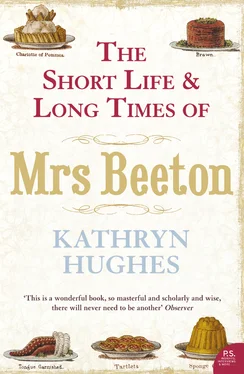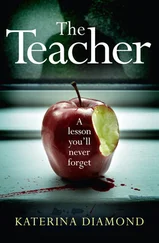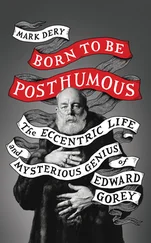1 ...8 9 10 12 13 14 ...33 You just know that Mrs Beeton would love to step into that picture. The Book of Household Management is saturated with a longing for an agrarian world that has already slipped into extinction but just might, by some enormous effort of will, be brought back into play. So, in her instructions for making a syllabub Mrs Beeton suggests mixing up some sugar and nutmeg and then simply squirting the milk from the cow’s udder straight into the bowl. (For those unlucky readers who do not have their own cow immediately to hand Beeton suggests substituting a milk-filled jug poured from a great height to produce the required froth.)
Throughout the BOHM animals destined for the table are described in their natural habitat with such lulling, lyrical grace that you seem to find yourself watching them from the corner of a hot, summer meadow. Here, for instance, is Beeton describing the eating habits of a sheep: ‘indolently and luxuriously [the sheep] chews his cud with closed eyes and blissful satisfaction, only rising when his delicious repast is ended to proceed silently and without emotion to repeat the pleasing process of laying in more provender, and then returning to his dreamy siesta to renew the delightful task of rumination’. Elsewhere Beeton’s text is scattered with drawings that reinforce the unforced bounty of nature. Pigs snuffle in well-kept sties (no nasty urban courtyard here), a landrail hares through the undergrowth, while deer bound through what looks like heather with the Scottish Highlands peaking in the background. The illustration heading up the chapter on vegetables is a cornucopia of cabbage, onions, and leeks, seeming for all the world like something that has just been plucked from the soil in time for the Harvest Festival supper.
Such soft-focus rural fantasy was only possible because Mrs Beeton, like most of her readers, was actually a sharp-edged daughter of the industrial age. Her guidelines for domestic bliss have less to do with the farmhouse than the factory. Briskly she divides the working day into segments and allots each household member from the mistress to the scullery maid a precise set of tasks that read like a time and motion study. (There is no point housemaids starting work until 7 a.m. in the winter, for instance, since rising any earlier will be a waste of candle.) The labour is specialized, repetitive, and, more often than not, mechanized. Kitchen equipment is described and illustrated as if it were industrial plant; the laundry maid’s duties make her sound like the head boilerman on a steamship.
So, too, for all that Mrs Beeton gestures dewy-eyed to the days of ‘auld lang syne’ when households produced their own butter, eggs, bread, and wine, she spends much of her time urging short cuts on her readers. Commercially bottled sauces and pickles get a cautious welcome (they’re probably not as good as home-made, she admits, but at least they don’t cost any more). And when it comes to baking Beeton is ambivalent about whether you should even bother to do it yourself. The illustration to ‘General Observations on Bread, Biscuits and Cakes’ may show an artful pyramid of rustic-looking loaves, with a windmill grinding in the background, yet a few pages later Mrs Beeton dedicates several enthusiastic paragraphs to a newly patented system for mass-producing aerated bread. During this process ‘the dough is mixed in a great iron ball, inside which is a system of paddles … then the common atmospheric air is pumped out, and the pure gas turned on.’ It was from these unappetizing beginnings that the Aerated Bread Company or ABC would emerge to become a commercial giant of the nineteenth and twentieth centuries, providing white sliced loaf, as smooth and tasteless as sponge, to the nation.
None of this makes Mrs Beeton’s rusticism phoney, although her vision of agrarian Britain is quaintly out of date, lacking any mention of intensive farming methods, high seasonal unemployment, and endemic poverty among the rural working class. But what Beeton shared with some of the most persuasive voices of her age was the nagging feeling that all the good things about modern urban living – heat on demand, sauces that came out the same every time, a dripping pan furnished with its own stand – arrived at a cost. But what that cost was exactly, and whether it was too high a price to pay for convenience, safety, and comfort was something that she hardly had time to consider. Whirling not so much like a dervish as a cog in a particularly intricate machine, she pressed on in a blur of activity, determined to finish her 1,112 pages in record time. ‘The Free, Fair Homes of England’ remained a lovely, compensating dream.
CHAPTER TWO ‘Chablis to Oysters’
ALTHOUGH EPSOM LIES only 14 miles away from the City of London as the crow flies, it could not have been more different from the cluttered streets and close courts in which Isabella Mayson had spent most of the first seven years of her life. Positioned on a ridge in the North Downs, the town manages to be both flat and high at the same time. In the seventeenth and eighteenth centuries it enjoyed an extended spell as a restorative spa, when its indigenous salts were said to work wonders on jaded digestions. Samuel Pepys took the waters there a couple of times, finding it funny to watch as his fellow sippers rushed for the bushes, caught short by the salts’ laxative effect. But by the opening of the nineteenth century, the fashionably liverish had moved on to Cheltenham and Bath, leaving Epsom to its devices as a quiet market town that turned, once a year, into Gomorrah. Dickens got the scale of the transformation best, writing in 1851 that for most days of the year Epsom was virtually dead but how ‘On the three hundred and sixty fifth, or Derby Day, a population surges and rolls, and scrambles through the place, that may be counted in millions.’
For a few short days during the summer race meeting, well-mannered Epsom became the destination of every swell, Guards officer, dwarf, clerk, tart, orange-seller, thimble rigger, prize-fighter, crook, and lady of fashion in the country. Ruskin called the Derby the ‘English carnival’ and from the breaking hours on the day itself – usually in June – a spirit of excitement and misrule began to bubble far away in London. In Clapham, Mitcham, and Tooting, not to mention Belgravia, Hyde Park, and Knightsbridge people commandeered every phaeton, gig, barouche, four-in-hand, brake, tilbury, and donkey cart for the short journey south. Alongside the shambling caravan of race-goers trundled dusty sellers of every kind of snack, novelty, and stimulant, all shouting and shoving in their attempt to turn a copper, honest or otherwise. Every public house along the route was packed with Derby-goers in various stages of tipsiness and with only a passing interest in the racing. Some indeed never got further than the Swan at Clapham or the Cock at Sutton, and Dickens reckoned that most people returned from the day unable to remember the name of the winning horse, let alone its jockey. As the chaotic column of humanity approached the Surrey Downs the sheer press of numbers meant that it started to stall. A 7- or 8-mile tailback was not unknown and it could take a whole hour to clear the final 3 miles. Local hawkers took advantage of this pooling throng to press upon it anything from a racing card to pigeon pie, lemonade to a second-hand umbrella. The mood could turn merry, but seldom sour. As the Illustrated London News advised Derby-goers briskly: ‘if things are thrown at you, just throw them back.’
From 1837, if you were modern-minded, you could make the journey from London by train. The London–Brighton line took you as far as the quaintly named Stoat’s Nest, from where it was a 7-mile tramp to the Downs. Next year came the welcome news that a rival line, the London and South-Western, was to run special Derby Day excursion trains on their Southampton line. But such was the press at Nine Elms in south London, the result of thousands of people trying to pile onto eight meagre trains, that the police were called in to disperse the increasingly desperate crowd. Even then, the train only went as far as Surbiton, which was still a good 5 miles from the course. It was not for nearly another decade that a line was built all the way to Epsom.
Читать дальше












